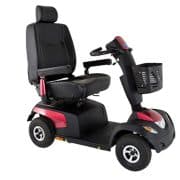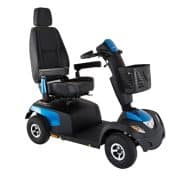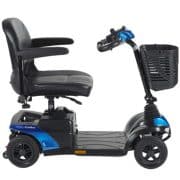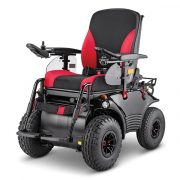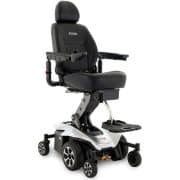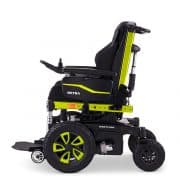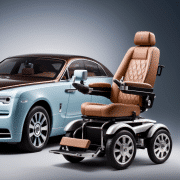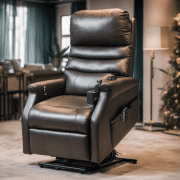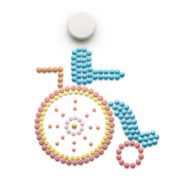Which is the Better Choice: Mobility Scooters or Electric Wheelchairs?
Mobility scooters and electric wheelchairs are essential for transforming the lives of those who experience limited mobility. These mobility aids are more than just a mobility device – they embody freedom, autonomy, and a restored sense of independence. In today’s modern world, mobility scooters and electric wheelchairs are among the top choices, providing users with...

Mobility scooters and electric wheelchairs are essential for transforming the lives of those who experience limited mobility. These mobility aids are more than just a mobility device – they embody freedom, autonomy, and a restored sense of independence.
In today’s modern world, mobility scooters and electric wheelchairs are among the top choices, providing users with a range of features and capabilities to suit their unique needs.
At Patient Handling, we offer some of the finest mobility scooters and electric wheelchairs available. However, how do you decide which one is right for you?
A Closer Look at Mobility Scooters
Mobility scooters are often the preferred option for individuals who possess a certain level of mobility but find prolonged walking taxing. These are particularly beneficial for outdoor activities such as visiting the local market, going around the community, or exploring larger recreational areas.
One of the major advantages of mobility scooters is the independence they provide. The days of scheduling rides or using taxis are over – with a scooter, spontaneous trips are back on the agenda.
Diving into the World of Electric Wheelchairs
Also known as power wheelchairs, these devices cater to individuals facing more severe mobility restrictions. They are versatile, designed for both indoor and outdoor environments, and are typically the option for those who require continuous mobility assistance.
Key Differences between Mobility Scooters and Power Wheelchairs
Design Aesthetics:
Mobility Scooters: Most mobility scooters possess a sleek, scooter-like appearance. Their design often includes a seat that is situated over the rear wheels, handlebars or a tiller for steering, and a foot platform. Customisation can be limited.
Power Wheelchairs: They are similar to the traditional manual wheelchair but are equipped with advanced electric motors and intuitive controls. They typically have a more compact design, with a seat positioned directly over the drive wheels and a joystick or control panel for maneuvering. They typically offer extensive customisation options to accommodate individual needs.
Maneuverability and Operation:
Mobility Scooters: Despite being outdoors-oriented, their battery life may not match that of power chairs. They are suited for traveling shorter distances on sidewalks and pathways. Using handlebars or a tiller similar to those on a motor scooter, they require both hands to steer and control.
Power Wheelchairs: Their compact design allows them to be more maneuverable indoors. They can navigate through narrow doorways, corners, and tight spaces more easily. A joystick or control panel mounted on the armrest facilitates movement, which requires less upper-body mobility. Plus, with some models, users can access a standing position feature, which lifts the power chair enabling the user to stand up to reach high shelves.
Comfort Dynamics:
Mobility Scooters: While some permit seat modifications, the comfort and ergonomic design of the seat are largely dependent on the model and range. Four-wheel scooters often have a wider and more spacious seating area than their three-wheel counterparts.
Power Wheelchairs: They win in the comfort department, especially for those needing continuous support. Power chairs are suitable for those who have postural issues or who cannot sit unsupported for long periods of time.
They are equipped with high-quality seats and are customizable for various postures and sitting and reclining positions. The central seat positioning over the drive wheels ensures even weight distribution, which enhances balance and stability while reducing the risk of tipping or discomfort.
Terrain Adaptability:
Mobility Scooters: Their performance on rough terrain is dependent on various factors such as design and wheel size. Some are better designed for rough terrain than others, particularly heavy-duty scooters with larger wheels and improved suspension systems.
Curbs can be challenging for some models. Smaller scooters may struggle to navigate curbs, while larger and more robust models may be better equipped.
Power Wheelchairs: They excel in tackling uneven terrain, thanks to robust drive wheels and superior suspension mechanisms, allowing them to handle rough surfaces, gravel paths, and uneven ground more effectively than scooters. Some power chairs have all-terrain capabilities for outdoor use.
They generally have better curb-handling capabilities compared to mobility scooters. Some power chairs are designed with curb-climbing features, allowing them to ascend or descend curbs of certain heights without difficulty.
Weighing the Pros and Cons of a Mobility Scooter vs Power Wheelchair
Mobility Scooters
Pros:
- Ideal for individuals with moderate mobility challenges who are mostly able-bodied with good arm and upper body strength to maintain their position comfortably over long periods of time.
- Diverse range catering to different terrains and distances. Some mobility scooters can navigate steep hills and travel reasonable distances on a single charge.
- Foldable designs are available, allowing them to be collapsed into a more compact form for easier transportation.
- Straightforward operation for beginners who have never ridden one before.
Cons:
- Requires a certain level of physicality to operate. They are not suitable for those who do not possess good trunk and arm strength.
- Larger turning circle which impacts maneuverability indoors.
- Limited back support compared to power chairs. It is not recommended to spend an entire day in one.
- Not always space-efficient and can take up quite a lot of space if they are not collapsible.
- The range of adjustments and customizability is more limited compared to power chairs.
Power Wheelchairs
Pros:
- Ideal for those with severe mobility limitations and body strength. They enable the individual to control everything they need without having to strain or sit uncomfortably for prolonged periods of time.
- Smaller turning circle provides superior indoor and outdoor abilities.
- Often constructed with features that enhance their performance on uneven terrain.
- Fully customizable. They offer more seating options for comfort, headrests, and specialized cushions to prevent pressure injuries and improve postural support by reclining the backrest and raising or lowering the footrest.
Cons:
- Can be initially tricky to control. The joystick or touch buttons are generally more sensitive than a scooter.
- Normally heavier and more solidly constructed. With that said, typically users rarely switch from a power chair to a car seat. For car boot transfer, a wheelchair hoist is an effective solution.
- May require specialized vehicles for transportation. Users often require Wheelchair Accessible Vehicles (WAV) like minivans, vans, or SUVs, which can be converted.
Making Your Choice
Consider your mobility requirements, daily activities, and potential future needs. Select a device that can accommodate potential changes in your mobility and lifestyle. Remember consulting with a healthcare professional or mobility specialist can provide valuable insights.
Take your time to thoroughly examine and test both options to make an informed choice that enhances your mobility and quality of life. Our suggestion is for individuals with greater mobility (such as those capable of standing and walking without assistance) to choose a mobility scooter. Should an individual have limited mobility and require greater assistance, a power chair becomes the more suitable option. If you are uncertain, don’t hesitate to contact us – we’re here to assist you!
Recommended Reading
Best Mobility Scooter Ramps in Australia | A Buying Guide
Mobility Scooters & Electric Wheelchairs What You Can And Cannot Do on the Road
Top 5 Mobility Aids In 2020
5 Most Important Things to Consider When Buying an Electric Wheelchair
How to Easily Travel in Public Transport with a Wheelchair
Preferred Suppliers for the Healthcare Industry Since 2003
Patient Handling is founded on a sound base of great staff, great products and great partners. We strive to put our clients needs above all else and focus on well thought out solutions for complex needs.



Receive latest news
Contact Us
We are an online store only. Please contact us if you would like a product specialist to assist with your purchase.















